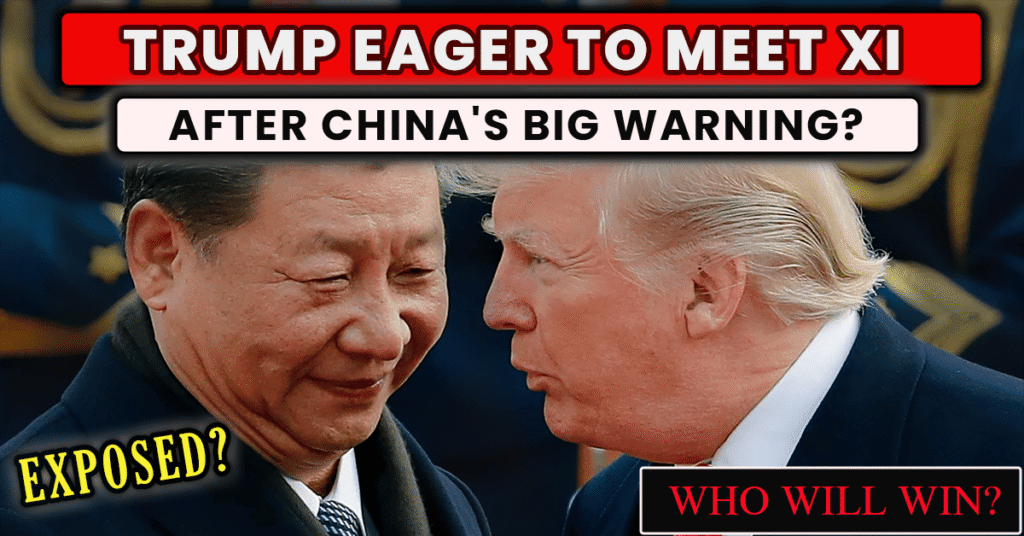
As the long-awaited historical meeting between U.S. President Donald Trump and Chinese President Xi Jinping approaches, Washington and Beijing are sending significantly different signals regarding their sentiments, with one signalling optimism and confidence, and the other one caution and restraint.
U.S.: Upbeat and Deal-Oriented
In the lead-up to his meeting with Xi, President Trump has been projecting an air of confidence by arguing that the two parties will walk away with a deal. Coming to South Korea before the summit, Trump informed reporters that the relations between America and China are excellent and that he is hopeful of a very good result for the nation and the world.
The U.S administration has given hints on the items on the agenda: a potential extension of the tariff truce, Chinese rebuys of American soybeans, and a general attempt to scuttle trade tensions. Trump also suggested that the talks might go further into high technology matters, stating that he would bring up the new generation AI chip of Nvidia with Xi.
Combined, the U.S. rhetoric is cheerful – a play of bargaining optimism meant to demonstrate strength back home and preparedness internationally.
China: Caution and Principle
Beijing has been restrained, on the contrary. Chinese Premier Li Qiang issued threats of a re-emergence of the concept of unilateralism and the law of the jungle in international trade at the recent ASEAN Summit in Kuala Lumpur. The Chinese state media have on several occasions urged Washington to collaborate in protecting hard-earned gains in the global economic order.
Although China has indicated that it is open to cooperation, its communication is focused on protecting the status quo of global trade, preserving face on the negotiating table, and preventing the feeling that it is abiding by the pressure of the U.S. The tone is of domestic expectations as well as the intent of Beijing to reflect itself as a responsible global power.
Key Issues on the Table
The meeting of diplomatic niceties covers a number of sharp points that are still characteristic of U.S. relations with China
Tariffs and trade: The two countries seem on the verge of a framework agreement that has the potential to extend the tariff truce and rekindle major agricultural trade, especially the U.S. soybean imports.
Technology and export controls: The discussion can mention semiconductors and AI chips, especially American export restrictions on the latest technology.
Fentanyl precursor chemicals: Washington is urging Beijing to intensify fentanyl-precursor chemical exports, possibly with tariff relief as an incentive.
Taiwan and security issues: As the US still maintains support of Taiwan, Beijing has once again made the assertion that it will by no means rule out the application of force to defend territorial integrity.
Why the Words Matter
The basis of such pronouncements is much more than diplomacy. The world markets, investors and corporations are waiting anxiously to see whether it will thaw or not. To China, a low profile will mean that it is not going to give up on its sovereignty and values. In the case of the U.S., a confident tone will be assertive and aggressive and therefore will be used to create expectations before a negotiation to assure domestic audiences that the administration is negotiating at a position of strength.
Hopefully, business groups in the two countries are optimistic that the summit can result in some tangible progress, not only in the reduction of tariffs but also in the explanation of the future rules of trade. Even token gestures might bring back some semblance of predictability to one of the most consequential relationships in the world after years of friction.
Looking Ahead
As Trump and Xi lay groundwork to their meeting later this week, in South Korea, the rhetoric disparity involving the assured deal discussion by Washington and the measured diplomacy of Beijing prepares a balancing game that is well-coordinated.
The success of the meeting will not be judged by the conclusion made by the signing of agreements, but the ability of both leaders to restore the lost trust and deal with competition in a global economy that is yet to recover after years of uncertainty. The currently spoken words, careful, confident, and calculated, might become the words that define the further stage of U.S. U.S.-China relationship.
A digital marketer possessing excellent knowledge and skill in off-page, on page and local SEO is competent in the challenging environment. Hard-working, energetic, and a quick learner for any task delegated. Enthusiastic to learn and constantly upgrade knowledge. Mohit brings over 2 years of experience in crafting content that not only ranks well but also provides valuable insights to readers.

